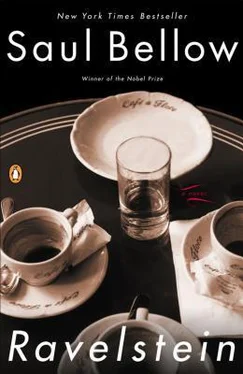"I'm not too surprised at Lloyd George," Ravelstein said. "He was a contentious little fucker. He visited Hitler in the thirties and came away with a high opinion of him. Hitler was a dream of political leaders. Whatever he wanted done was done, and quickly. No muss, no fuss. Very different from parliamentary government." It was enjoyable to hear Ravelstein on what he called Great Politics. He speculated often on Roosevelt and Churchill. He had a great respect for de Gaulle. From time to time he got carried away. Today, for instance, he spoke of Lloyd George's "pungency."
"Pungency is good," I said.
"In the matter of language the Brits had it all over us. Especially when their strength began to bleed away and language became one of their important resources."
"Like Hamlet's whore who must unpack her heart with words."
Ravelstein, with his bald powerful head, was at ease with large statements, big issues, and famous men, with decades, eras, centuries. He was, however, just as familiar with entertainers like Mel Brooks as with the classics and could go from Thucydides' huge tragedy to Moses as played by Brooks. "He comes down from Mount Sinai with the commandments. God had handed down twenty but ten fall from Mel Brooks's arms when he sees the children of Israel rioting around the Golden Calf." Ravelstein loved these Catskill entertainments; he had a natural gift for them.
He was very pleased with my Keynes sketch. He remembered that Churchill had called Keynes a man of clairvoyant intelligence-Abe loved Churchill. As an economist, Milton Friedman had it over most others, but Friedman was a free-market fanatic and had no use for culture, whereas Keynes had a cultivated intelligence. He was, however, wrong about the Versailles Treaty and deficient in politics, a subject of which Ravelstein had a very special understanding.
Abe's "people" in Washington kept his telephone line so busy that I said he must be masterminding a shadow government. He accepted this, smiling as though the oddity were not his but mine. He said, "All these students I've trained in the last thirty years still turn to me, and in a way the telephone makes possible an ongoing seminar in which the policy questions they deal with in day-to-day Washington are aligned with the Plato they studied two or three decades ago, or Locke, or Rousseau, or even Nietzsche."
It was very pleasant to win Ravelstein's approval, and his students kept coming back to him-men now in their forties, some of whom had figured significantly in running the Gulf War, spoke to him by the hour. "These special relationships are important to me-top priority." It was as natural that Ravelstein should need to know what went on in Downing Street or the Kremlin as it had been for Virginia Woolf to read Keynes's private report on German reparations. Possibly Ravelstein's views or opinions sometimes worked their way into policy decisions, but that wasn't what mattered. What mattered was that he should remain in charge somehow of the ongoing political education of his old boys. In Paris too he had a following. People who had taken his courses at the Йcole des Hautes Йtudes, just back from a mission to Moscow, also rang him up.
There were sexual friendships and intimate confidences as well. Beside the wide black leather sofa back home where he took the calls was an electronic panel of which he made expert use. I couldn't have operated it. I had no high-tech skills. But Ravelstein, though his hands were unsteady, controlled his instruments like a Prospero.
In any case he didn't have to worry now about the telephone bills.
But we are still atop the Hotel Crillon.
"You have good instincts, Chick," he said. "Too bad you didn't have more nihilism in your makeup. You should have been more like Celine with his nihilistic comedy, or farce. The scorned woman saying to her boyfriend, Robinson, 'Why can't you say "I love you"? What's so special about _you?__ You get a hard-on like anybody else. _Quoil Tu ne bandes pas?__' A hard-on to her is the same as love. But Robinson the nihilist is high-principled about one thing only, not to lie about the very, very few things that really matter. He'll try any kind of obscenity but he draws the line at last, and this tramp woman, deeply insulted, shoots him dead because he won't say 'I love you.'"
"Does Celine mean that this makes him authentic?"
"It means that writers are supposed to make you laugh and cry. That's what mankind is looking for. The situation of this Robinson is a replay of the drama of the Middle Ages in which the most vicious, abandoned criminals turn again to the Blessed Virgin. But there's no disagreement here. I want you to do me as you did Keynes, but on a bigger scale. And also you were too kind to him. I don't want that. Be as hard on me as you like. You aren't the darling doll you seem to be, and by describing me maybe you'll emancipate yourself."
"From what, exactly?"
"Whatever it is that controls you-some sword of Damocles hanging over you."
"No," I said. "It's the sword of Dimwitoclese." The conversation, if it had taken place in a restaurant, would have made the other diners think that we were telling sexy jokes, having a rollicking time. "Dimwitoclese" was Ravelstein's kind of gag, and he laughed like Picasso's wounded horse in _Guernica__, rearing back.
Ravelstein's legacy to me was a subject-he thought he was giving me a subject, perhaps the best one I ever had, perhaps the only really important one. But what such a legacy signified was that he would die before me. If I were to predecease him he would certainly not write a memoir of me. Anything beyond a single page to be read at a memorial service would have been unthinkable. Yet we were close friends, none closer. What we were laughing about was death, and of course death does sharpen the comic sense. But the fact that we laughed together didn't mean that we were laughing for the same reasons. That Ravelstein's most serious ideas, put into his book, should have made him a millionaire certainly was funny. It took the genius of capitalism to make a valuable commodity out of thoughts, opinions, _teachings__. Bear in mind that Ravelstein was a teacher. He was not one of those conservatives who idolize the free market. He had views of his own on political and moral matters. But I am not interested in presenting his ideas. More than anything else, just now, I want to avoid them. I want to be brief, here. He was an educator. Put together in a book his ideas made him absurdly rich. He was spending the dollars almost as fast as they came in. Just now he was considering a new $5 million book contract. He could also command big fees on the lecture circuit. And he was a learned man after all. Nobody disputed that. You have to be learned to capture modernity in its full complexity and to assess its human cost. On social occasions he might be freaky, but on the platform you could see how well grounded his arguments were. It became only too clear what he was talking about. The public saw a higher education as a right. The White House affirmed it. Students were like "the mackerel-crowded seas." Thirty thousand dollars was the average annual college tuition. But what were students learning? The universities were permissive, lax. The Puritanism of an earlier time was gone. Relativism held that what was right in San Domingo was wrong in Pago Pago and that moral standards were therefore anything but absolute.
Now Ravelstein was no enemy of pleasure or opposed to love. On the contrary he saw love as possibly the highest blessing of mankind. A human soul devoid of longing was a soul deformed, deprived of its highest good, sick unto death. We were offered a biological model that dismissed the soul and stressed the importance of orgiastic relief from tension (biostatics and biodynamics). I don't intend to explain here the erotic teachings of Aristophanes and Socrates or of the Bible. For that you must go to Ravelstein himself. For him Jerusalem and Athens were the twin sources of civilization. Jerusalem and Athens are not my dish. I wish you well with them. But I was too old to become Ravelstein's disciple. All I need to say now is that he was taken very seriously even in the White House and on Downing Street. He was Mrs. Thatcher's weekend guest at Chequers. Nor did the President neglect him. Reagan invited him to dinner, and Ravelstein spent a fortune on formal attire, cummerbund, diamond studs, patent leather shoes. A columnist on the _Daily News__ said that to Ravelstein money was something you threw from the rear platform of speeding trains. Ravelstein with shouts of laughter showed me the clipping. Through it all he was deeply amused. And of course I didn't have the same reasons for amusement. The vast hydraulic forces of the country had not picked me up, as they had him.
Читать дальше












